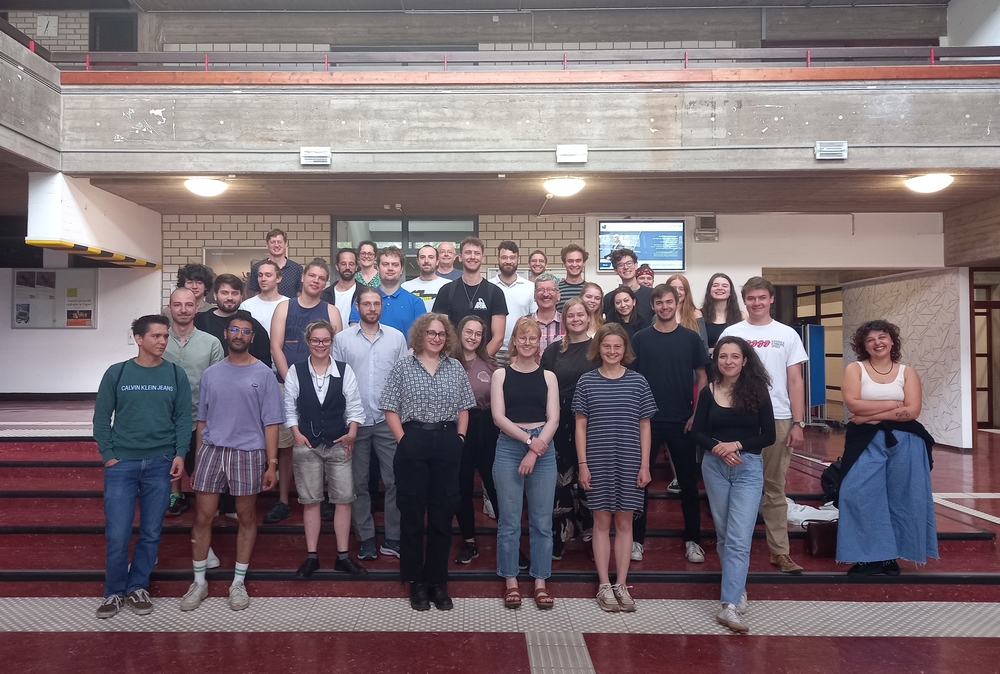5. Seminar zur Philosophie der Physik
Philosophie der Quantenmechanik
Siegen, 13. – 15. Juli 2023
Bild © Ramona Fontaine, Interference No. 2
Der Workshop richtete sich insbesondere an Bachelor- und Masterstudierende der Physik und der Philosophie, aber auch an Studierende anderer Fachrichtungen. In Fachvorträgen und Diskussionsgruppen wurde den Teilnehmer*innen das Forschungsgebiet der Philosophie der Physik vorgestellt. Schwerpunkt war die Philosophie der Quantenmechanik, diesmal insbesondere zu den Themen Ununterscheidbarkeit und Leibniz-Prinzip, Quantenlogik sowie Interpretation der Quantenmechanik.
Organisation: Maren Bräutigam (Köln), Niels Linnemann (Genf), Anastasja Petrović (Köln), Kian Salimkhani (Köln), Annica Vieser (Amsterdam), Karla Weingarten (München)
Der Workshop wurde unterstützt durch die Uni Siegen, die AGPhil der Deutschen Physikalischen Gesellschaft (DPG) und die Deutsche Gesellschaft für Wissenschaftsphilosophie (GWP).

Programm
Voraussichtlich am Freitag, den 7.7., findet vorbereitend eine optionale allgemeinverständliche Einführung in die Grundlagen der Quantenmechanik statt (online).
| Donnerstag, 13.7. |
Freitag, 14.7. |
Samstag, 15.7. |
|---|---|---|
| 9:00 – 10:30 Vortrag Veronika Baumann, Wien Wigner’s friend type experiments and the interpretations of quantum theory |
9:00 – 10:30 Vortrag Sonja Smets, Amsterdam Logic Meets Quantum Physics |
|
| Pause | Pause | |
| 11:00 – 12:30 Diskussionsgruppen |
11:00 – 12:30 Diskussionsgruppen |
|
| Mittagessen | Mittagessen | |
| Optionales Programm | 14:00 – 15:30 Vortrag Tomasz Bigaj, Warsaw On the discernibility of same-type particles |
14:00 – 15:30 Studierendenvorträge |
| Pause | Pause | |
| 16:00 – 17:30 Diskussionsgruppen |
16:00 – 18:00 Abschlussdiskussion |
|
| 17:30 – 18:30 Eröffnung |
Gemeinsames Abendessen | |
| 18:30 – 20:00 Vortrag Cord Friebe, Siegen Title tba |
||
| Gemeinsames Abendessen |
Abstracts (nach Programmablauf geordnet)
Cord Friebe (Siegen): tba
Veronika Baumann (Wien): Wigner’s friend type experiments and the interpretations of quantum theory
Wigner’s-friend experiments exploit the fact that (standard) quantum theory comprises two different dynamics, namely the collapse of the wave function and unitary evolution. They feature regular observers – friends – who measure quantum systems, and so-called superobservers – Wigners – who perform joint measurements on the quantum systems, the friends and potentially other relevant degrees of freedom. If both friends and Wigners can reason about the measurement results in their setup they might arrive at a contradiction, if they use different formal descriptions for a quantum measurement. In recent years new proposals involving Winger’s friend experiments have been used to devise new arguments and no-go theorems for quantum theory, which sparked renewed debate in the quantum-foundations community. Proponents of different interpretations of quantum theory offered different responses and resolutions to these issues raised by the new Winger’s friend setups. I want make a clear distinction between the formalism and the interpretations of quantum theory and show that there are actually two inequivalent quantum formalisms when considering Wigner’s friend. Different interpretations might argue in favor of using one formalism or the other as well as giving a preference as to which assumptions to dismiss in order to resolve no-go theorems.
Tomasz Bigaj (Warschau): On the discernibility of same-type particles
In this lecture I will briefly present a formal method of discerning quantum particles that is consistent with the symmetrization postulate, i.e. the assumption that the state of same-type particles must be either symmetric or antisymmetric. I will show that in the case of fermions the proposed method guarantees the absolute discernibility in any state, whereas for bosons the indiscernibility remains for the products of identical states. Some further problems, such as the non-uniqueness (ambiguity) of individuation, will be mentioned and discussed.
Sonja Smets (Amsterdam): Logic Meets Quantum Physics
In this presentation I will show how concepts coming from modal Logic, and in particular concepts coming from dynamic logic, can be used to model and interpret quantum behavior. The main thesis in this work is that all the non-classical properties of quantum systems are explainable in terms of the non-classical flow of quantum information. I will first illustrate how this specific approach to the logical foundations of Quantum Mechanics works. Next I will use this approach to provide an answer to the question of whether quantum mechanics forces us to give up some basic principles of classical propositional logic such as Distributivity (of Conjunction over Disjunction, and vice-versa) or even Bivalence.
Discussion groups
(A) Maren Bräutigam (Köln): Ununterscheidbarkeit
(B) Annica Vieser (Genf): Quantenlogik
(C) Karla Weingarten (München): Interpretation der Quantenmechanik
Call for Participation
Der Workshop richtet sich insbesondere an Bachelor- und Masterstudierende der Physik und der Philosophie, aber auch an Studierende anderer Fachrichtungen. In Fachvorträgen und Diskussionsgruppen wird den Teilnehmer*innen das Forschungsgebiet der Philosophie der Physik vorgestellt. Schwerpunkt ist die Philosophie der Quantenmechanik, diesmal insbesondere zu den Themen Ununterscheidbarkeit und Leibniz-Prinzip, Quantenlogik sowie Interpretation der Quantenmechanik. Bei Interesse besteht für die Teilnehmer*innen auch die Möglichkeit, eigene Vorträge (20 Minuten Vortrag, 10 Minuten Diskussion) zu halten.
Vorkenntnisse in Physik oder Philosophie sind nicht erforderlich. Für die Teilnehmer*innen werden zwei Übernachtungen inkl. Frühstück und (ggf. anteilige) Reisekosten übernommen. Wir freuen uns auf eure Bewerbungen!
Hinweis: Zu den vier Vorträgen sind alle Interessierten herzlich eingeladen, eine Anmeldung ist nicht nötig.
Bewerbungsfrist: 25. Juni 2023 15. Juni 2023
Unterlagen (als eine PDF): kurzes Motivationsschreiben (max. eine Seite) und Lebenslauf; optional: Titel und Abstract (200 Wörter) des eigenen Vortrags
Kontakt: seminar(at)philosophiederphysik.de
Organisation: Maren Bräutigam (Köln), Niels Linnemann (Genf), Anastasja Petrović (Köln), Kian Salimkhani (Köln), Annica Vieser (Amsterdam), Karla Weingarten (München)
Der Workshop wird unterstützt durch die Uni Siegen, die Deutsche Gesellschaft für Wissenschaftsphilosophie (GWP) und die AGPhil der Deutschen Physikalischen Gesellschaft (DPG).